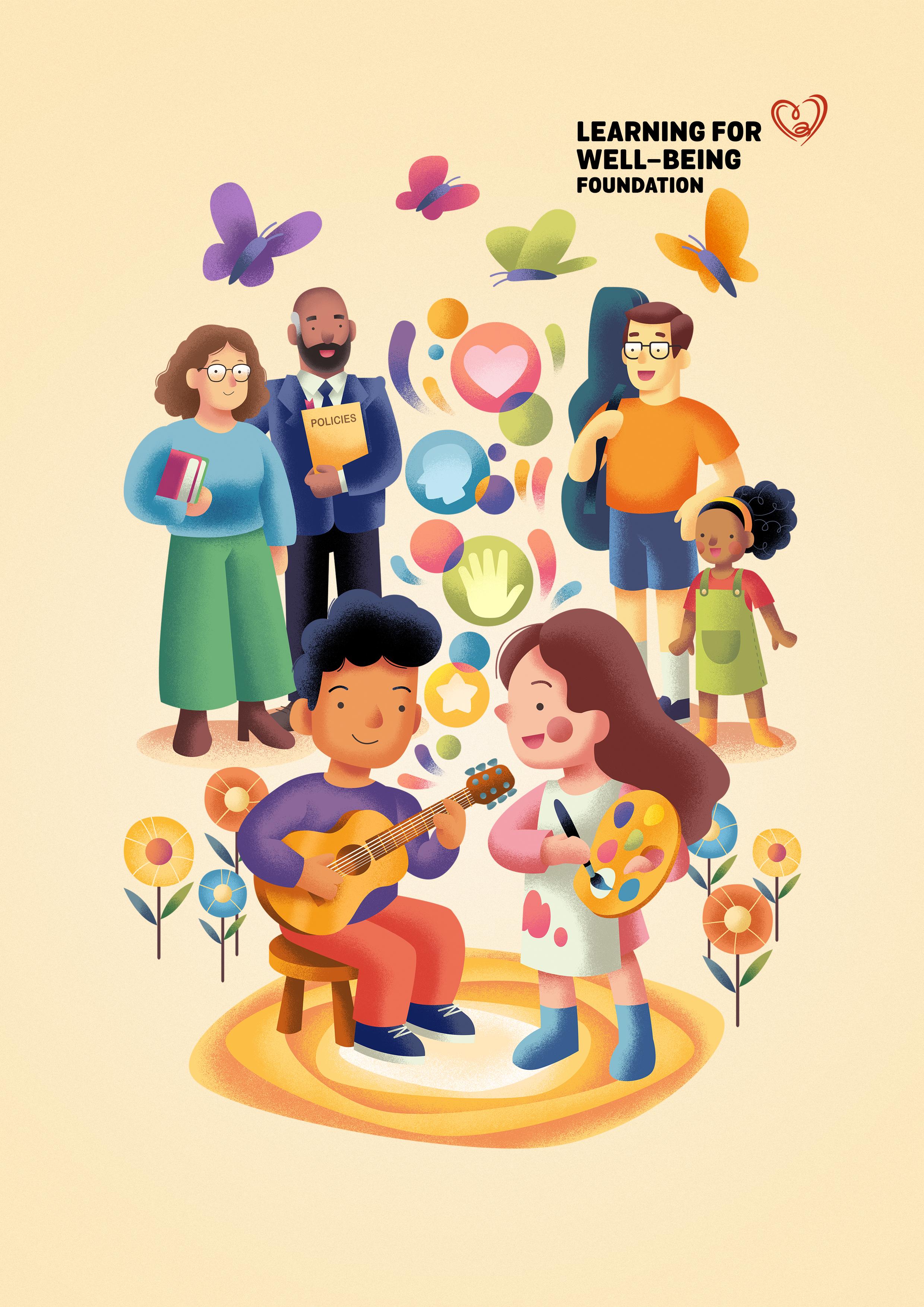
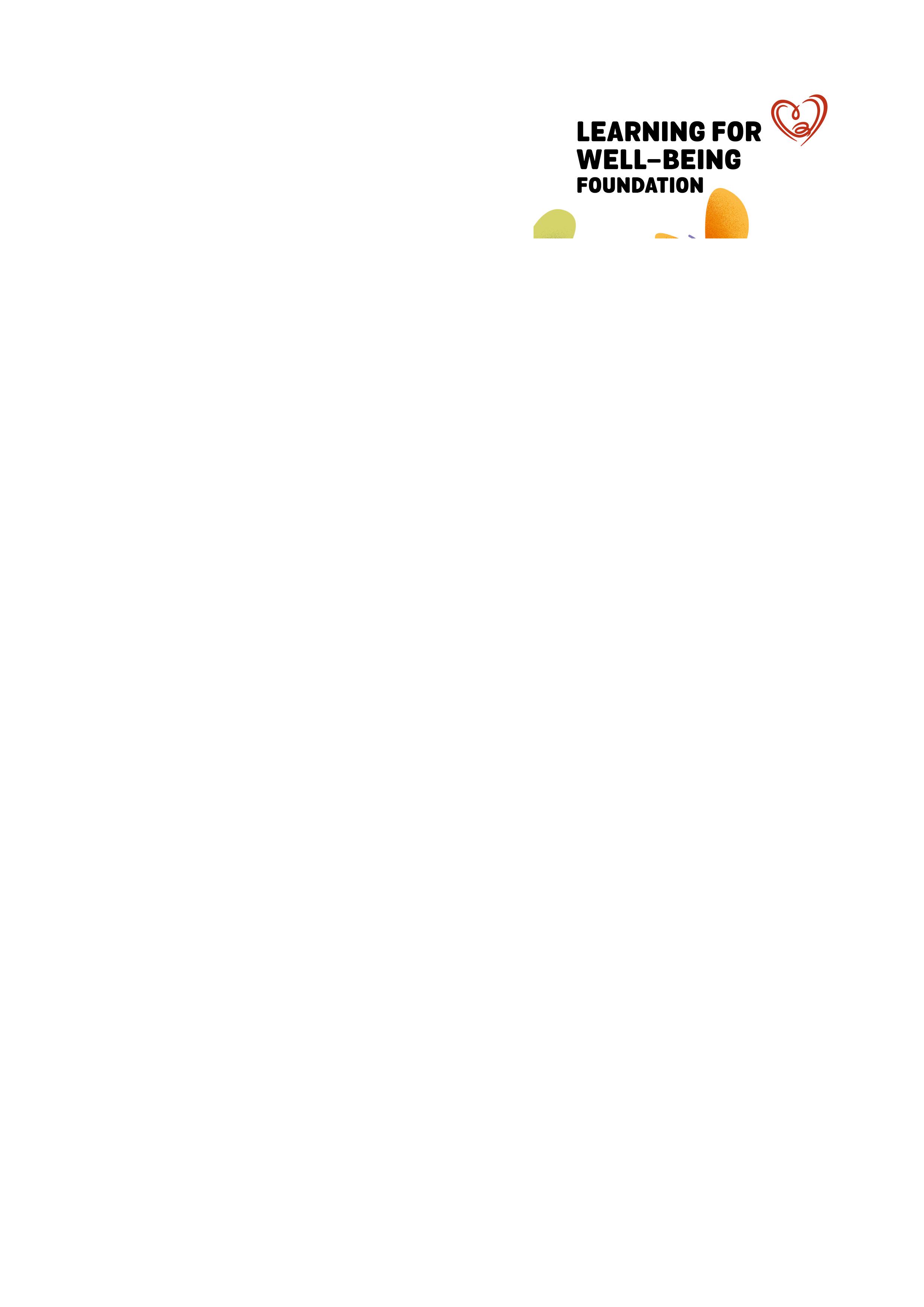





2024 has been a year marked by deep uncertainty and transformation. Around the world, children have faced growing challenges—rising mental health concerns, climate instability, political unrest, and widening inequalities—that place their wellbeing and futures under strain. Yet, in the face of these complex realities, the Learning for Well-being Foundation has remained steadfast in its vision: A world where every child can fulfil their unique potential.
This vision continues to guide every aspect of our work. Across regions and sectors, we have supported children not only as beneficiaries but as agents of change. From local school parliaments in Palestine to national youth policy development in Bolivia, from youth-led design of mental health tools in the Netherlands to policy dialogues in the European Parliament, our efforts this year have elevated children’s voices in shaping the systems that affect their lives daily.
We define well-being holistically—embracing emotional, physical, mental, and spiritual dimensions—and we recognise that nurturing these aspects requires more than programmatic interventions. It demands the transformation of relationships, institutions, and mindsets. That’s why during 2024 we reinforced our commitment to systemic change through three core impact areas: school reform, holistic well-being, and intergenerational collaboration.
This Annual Report illustrates how our initiatives— whether co-creating inclusive curricula, building youth advisory structures, or advocating for child-centred policies—are grounded in evidence, guided by our values, and brought to life through meaningful partnerships. It also reflects an important internal journey: a collective effort to deepen our own coherence, capacity, and care within the Foundation.
As we look to 2025, our new programme structure—focusing on Inner Diversity, Relationships & Communication in Families, and Participation & Engagement—marks a powerful evolution in translating our vision into action. These programmes are more than strategic priorities; they are commitments to walk alongside children, educators, families, and communities in ways that honour uniqueness and foster shared responsibility.
In a world that too often overlooks the inner life of children, we stand for a different possibility—one where every child is seen, heard, and supported to thrive.
Thank you for joining us on this journey.
Yakarah Attias-Rosen Managing Director
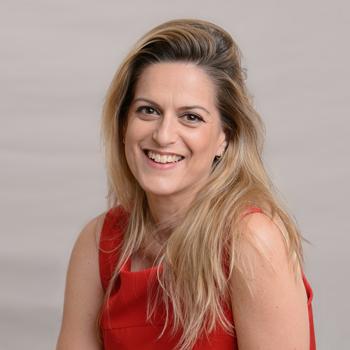
We promote holistic well-being with children, practitioners and policymakers as our contribution so that every child can fulfil their unique potential.
By holistic well-being, we refer to the realisation of one’s unique potential through physical, emotional, mental, and spiritual development in relation to oneself, others, and the environment. It means enabling individuals to make decisions and take actions that benefit themselves and the communities to which they belong.
Our purpose is expressed through a focus on systems that affect children daily. To achieve lasting impact, our activities prioritise working in education, schooling, families and communities, where transformation is not only needed but possible
Our values define the way we work and the way we are recognised by others. In 2024, they continued to serve as success factors that guide our work:
• Application of the L4WB Framework holistically – ensuring all activities reflect an integrated and human-centred approach.
• Intergenerational Partnership – affirming young people’s role not just as participants but as co-creators of change.
• Cutting-edge, reliable, and evidence-based practice – rooted in critical reflection, research, and adaptive learning.
These values are not just words. They are practised, demonstrated, and reinforced through our internal culture and our work with partners across the world.
Our areas of impact reflect our commitment to help every child fulfil their unique potential.



SCHOOL REFORM
HOLISTIC WELL-BEING
INTERGENERATIONAL COLLABORATION
LEARN MORE ABOUT OUR AREAS OF IMPACT



In 2024, Act2gether marked five years of advancing child and adolescent participation as a driver of inclusive social transformation in Bolivia. The initiative reaffirmed its role as a national reference in intergenerational collaboration, supporting over 3,200 children and adolescents in influencing decisions that affect their lives, from classrooms and communities to municipal and national governance.
Through partnerships with government institutions, civil society organisations, and educators, Act2gether contributed to embedding participation as a sustained practice in local systems. Key milestones included:
• The continued implementation of Empowering from the Root, co-led with EDUCO, which enabled children from early childhood to adolescence to co-create solutions in their schools and communities.
• The launch of a rights-based Toolbox for Early Childhood Participation, reaching over 800 children and 42 teachers.
• The development of the Municipal Youth Plan 2025–2026 in La Paz, guided by young people's lived realities and priorities.
• National-scale support to children’s committees through the third phase of Mi Participación Cuenta, achieving full municipal mapping and strengthened coordination at all levels.
Despite the challenges posed by political uncertainty and a lack of prioritisation for children’s rights in public policy, the initiative expanded access to meaningful participation and co-created tools that support sustained engagement across generations.

KEY FIGURES:
• 3,200+ children and adolescents reached
• 21 municipal and 9 departmental children’s committees strengthened
• 100% national coverage of municipal participation structures
• 836 early childhood beneficiaries and 78 trained educators
• 343 municipal officers consulted nationwide

• BUILDING A PARTICIPATION SYSTEM: FROM EARLY CHILDHOOD TO MUNICIPAL COMMITTEES
• YOUTH LEAD THE WAY IN LOCAL POLICY PLANNING
• SCALING NATIONAL PARTICIPATION THROUGH COMMITTEES AND MAPPING
In the Netherlands, Act2gether came to life through a partnership with Jimmy’s—creating inclusive spaces where young people could explore well-being through reflection, connection, and hands-on practice. Rooted in intergenerational dialogue, the initiative introduced the concept of core capacities as practical tools to build self-awareness, strengthen trust, and nurture meaningful relationships.
Over 50 young people participated in immersive workshops and a forest-based youth festival, where they defined what well-being means to them and co-developed practices grounded in their lived experiences. These insights are now shaping the forthcoming Boost Your Wellbeing Toolkit—a participatory resource designed for schools, youth hubs, and community spaces
Funded by the Triodos Foundation, this initiative shows how values-based partnerships can generate context-sensitive solutions—while elevating young voices to build a culture of wellbeing from the ground up.
In Germany, Act2gether is laying the groundwork for long-term, intergenerational change. In partnership with KinderRechteForum (KRF)— and with support from Aktion Mensch, AWO Bundesverband, and AWO Bezirksverband Mittelrhein—the initiative is bringing together participatory approaches with mental health and holistic well-being.
Throughout 2024, efforts focused on securing sustainable funding, deepening cross-sector partnerships, and co-designing programme elements with national and regional actors. A key milestone was the confirmation of a multiyear grant, setting the stage for a new phase of implementation.
KEY FIGURES:
• 50+ youth participants
• 3-stage youth-led process
• 1 Toolkit co-created by and for young people

• CO-CREATING TOOLS FOR HOLISTIC WELL-BEING IN THE NETHERLANDS

Planned activities for 2025 include school-based workshops that integrate participation and emotional well-being, intergenerational camps that foster connection and co-creation, and the launch of a national toolbox to help educators embed youth voice into well-being practices.
By strengthening its foundations in 2024, Act2gether in Germany is preparing to activate meaningful, youth-led transformation—built in collaboration across generations.
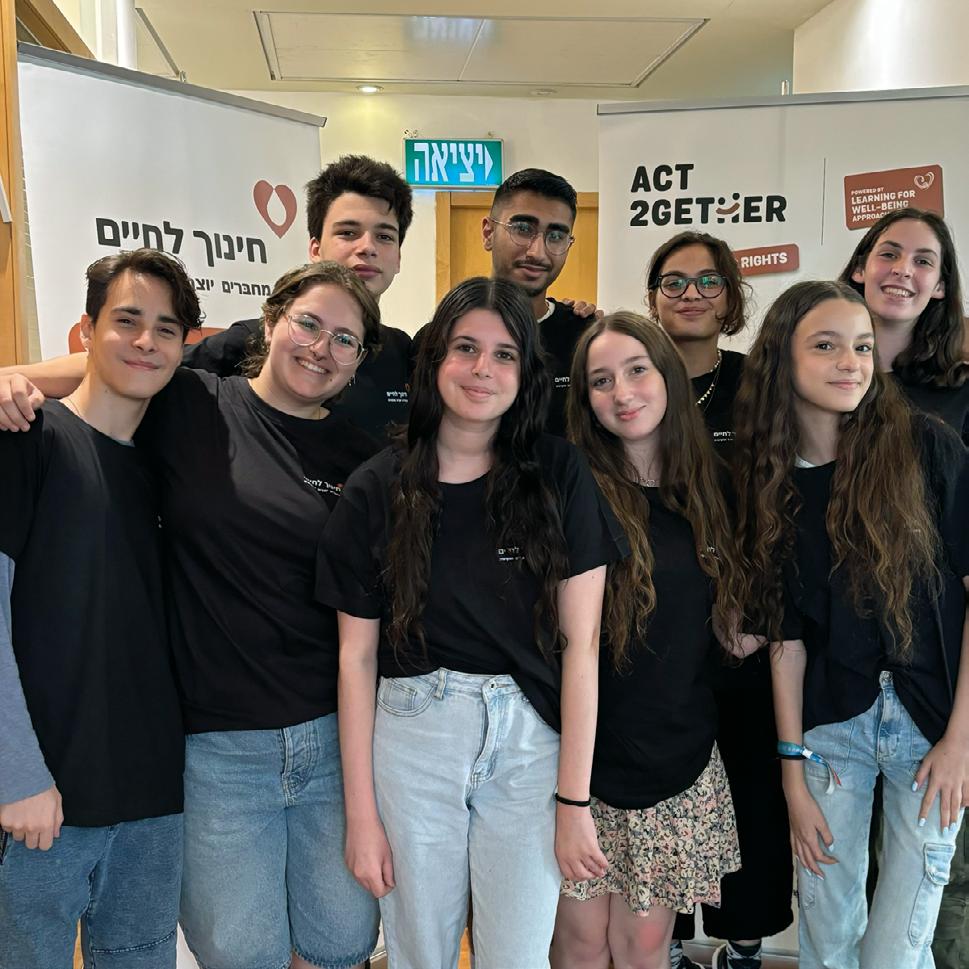

Funded by Fondation Botnar, the Act2gether for Child Rights and Well-being project empowers children in Israel and Palestine to become agents of change through locally led, child-centred programming.
Despite the conflict caused by the October 2023 crisis, both implementing partners—Education for Life (EFL) in Israel and the Universal Education Foundation (UEF) in Palestine— successfully restructured and relaunched their activities by late 2024. The renewed phase reflects a deeper focus on local relevance, resilience, and participation.
In Palestine, the programme supports school parliaments across the West Bank through two key strands: Peer-to-Peer mental health support and Right to Play initiatives. Guided by the Children’s Advisory Group (CAG), 58 school-based groups are implementing child-led projects using microgrants to promote well-being, play, and inclusion within their school communities.
In Israel, the focus is on child-led social action. Children receive leadership training and microgrants to design and implement their own projects that advance children’s rights and wellbeing. The Youth Advisory Group (YAG) plays a central role in shaping the programme and ensuring that youth voices guide decision-making and delivery.

Across both countries, the project applies the Learning for Well-being Framework in practice, centring children’s rights, participation, and agency. Locally grounded and intergenerational by design, the initiative fosters leadership, strengthens support networks, and builds shared responsibility for child well-being.
Inclusion becomes meaningful when it’s embedded in daily practices—and that’s what the Inclusion Box (iBOX) project worked to make possible. Led by the Lifelong Learning Platform and supported by a consortium of partners across Europe, this EUfunded initiative marked an important milestone in advancing diversity and participation across civil society and education.
The Learning for Well-being Foundation played a central role by co-creating training materials, facilitating capacity-building sessions, and shaping the final conference in Brussels. The project resulted in a rich set of practical tools—including a Compendium of Inspiring Practices, an Inclusion and Diversity Charter, and three self-paced online training courses—designed to turn inclusive values into concrete action.
Through this collaboration, we helped embed a rights-based, well-being-oriented approach that supports systemic transformation rooted in diversity, accessibility, and meaningful engagement.


• INCLUSION IN PRACTICE: LEARNING FOR WELL-BEING CONTRIBUTES TO THE EU IBOX PROJECT
Every child learns, feels, and expresses themselves in their own way—and education becomes truly inclusive when it recognises and responds to that inner diversity. In 2024, two complementary initiatives took shape to help make that vision a reality: TriDimensional Teaching (TriTeaching) and Talent without Borders. Both programmes offer practical tools for educators to understand and support the unique ways students engage with the world.
• TriTeaching, co-designed with Truus van Putten, is a professional development pathway for early childhood and primary educators. Grounded in didactic differentiation, it helps teachers tailor their approach to diverse learning patterns—through observation, reflection, and relationship-based teaching— using a cascading coaching model to build longterm capacity.
• Talent without Borders, developed with Fondazione CRC and set to launch in 2025 in Italy, brings this approach into secondary education. It encourages teachers to identify and nurture a wide range of talents by combining pedagogical differentiation with the development of core capacities such as listening, empathising, and reflecting.
Both programmes reflect the Learning for Wellbeing Framework’s emphasis on inner diversity— embracing the idea that every learner processes, grows, and connects in their own unique way. In 2024, key milestones included co-creating the programme concepts, designing the curricula, and building strong partnerships to prepare for pilot implementation.

An organisation rooted in the Learning for Wellbeing values, Education for Life (EFL) leads the implementation of the Learning for Well-being Framework in Israel through context-responsive programmes that support children, educators, and families.
Education for Life (EFL) deepened its impact across Israeli communities through a combination of ongoing programmes and new initiatives supporting children, caregivers, and educators.


• Caregiver Programme in Modi’in: Nearing completion, this initiative focused on enhancing the personal well-being of caregivers while equipping them with tools to foster stronger, more supportive relationships with children.
• Well-being Programmes in Lod and Haifa: These programmes concluded with tailored support for educators to apply well-being practices at both classroom and grade levels.
• Ramat HaSharon Social Responsibility and Educational Charter: Officially launched following a successful community-based project, embedding a shared vision of educational and civic responsibility.
• Educational Programme in Northern Israel: A new initiative in the Galilee and Golan regions focuses on strengthening resilience in conflict-affected communities. In 2024, meetings with local councils prepared the ground for a pilot project supporting both educational practice and community care.
• Instructor and Train-the-Trainer Programmes: Two capacity-building initiatives were launched—a three-day Instructor Training course and a Trainthe-Trainer programme—equipping participants with transformative pedagogical tools and fostering a collaborative learning culture.
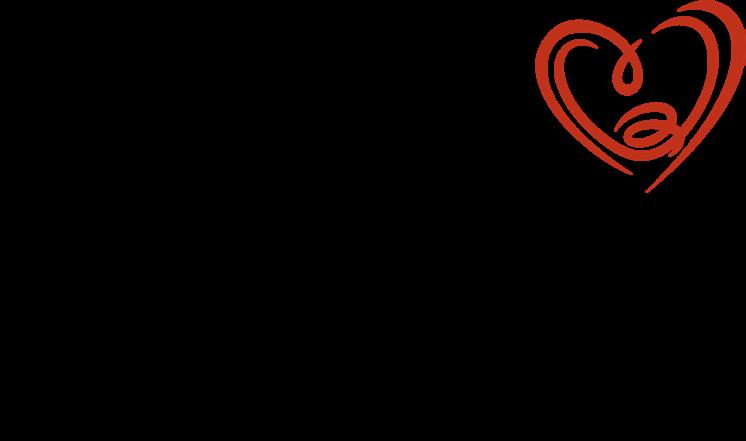
As a Palestinian branch of the Learning for Wellbeing Foundation, the Universal Education Foundation (UEF) implements the Foundation’s vision and Framework across the West Bank. Through local partnerships and direct engagement with children and educators, UEF anchors rightsbased and well-being-centred approaches in schools and communities.
UEF upheld its commitment to child participation and inclusive education through structured projects, strategic partnerships, and child-led activities.

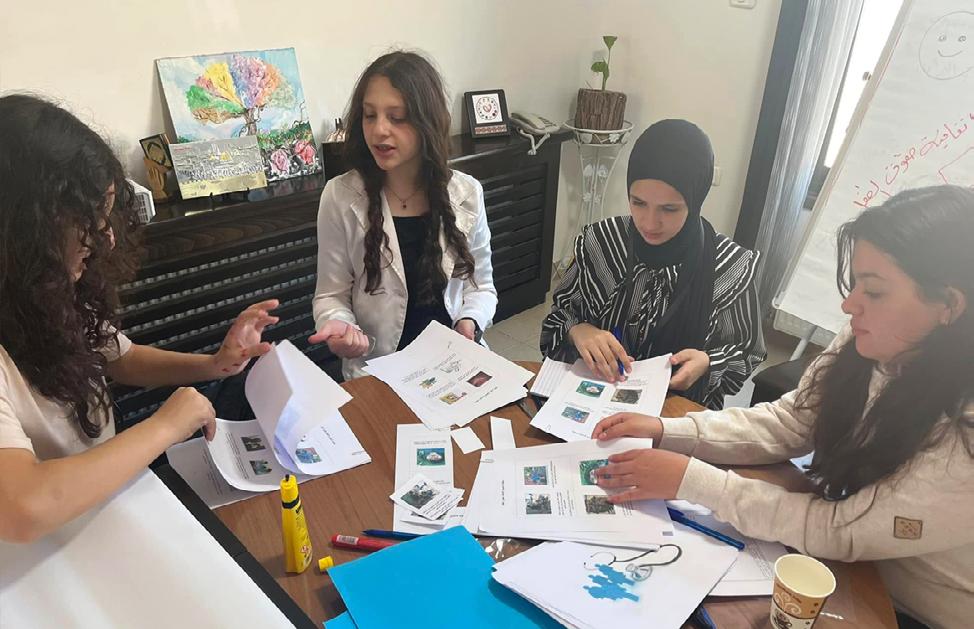
KEY ACTIVITIES:
Children’s Advisory Group (CAG)
• Developed child-friendly materials in Arabic and English, including illustrated capacity cards and a safeguarding booklet.
• Delivered capacity-building workshops for CAG members and selected child representatives to join the project’s Steering Committee.
Trainings and Workshops
• Delivered student parliament training focused on peer support, communication, and well-being.
• Delivered safeguarding and psychosocial support workshops in partnership with local and international organisations, including a 2-day training led by expert Richard Powell.
• Hosted a 3-day Training of Trainers (TOT) programme for 30 school counsellors across the West Bank.
Special Events
• Organised SOS Palestine Children’s Day with theatre and creative play for 68 children.
• Held arts-based psychosocial workshops for children and families in Bethlehem.
Partnerships and Agreements
• Signed new cooperation agreements with the Ministry of Education, SOS Children’s Villages, private schools, and health institutions. These partnerships supported holistic education, trauma recovery, peer learning, and a water safety project in eight vulnerable communities.

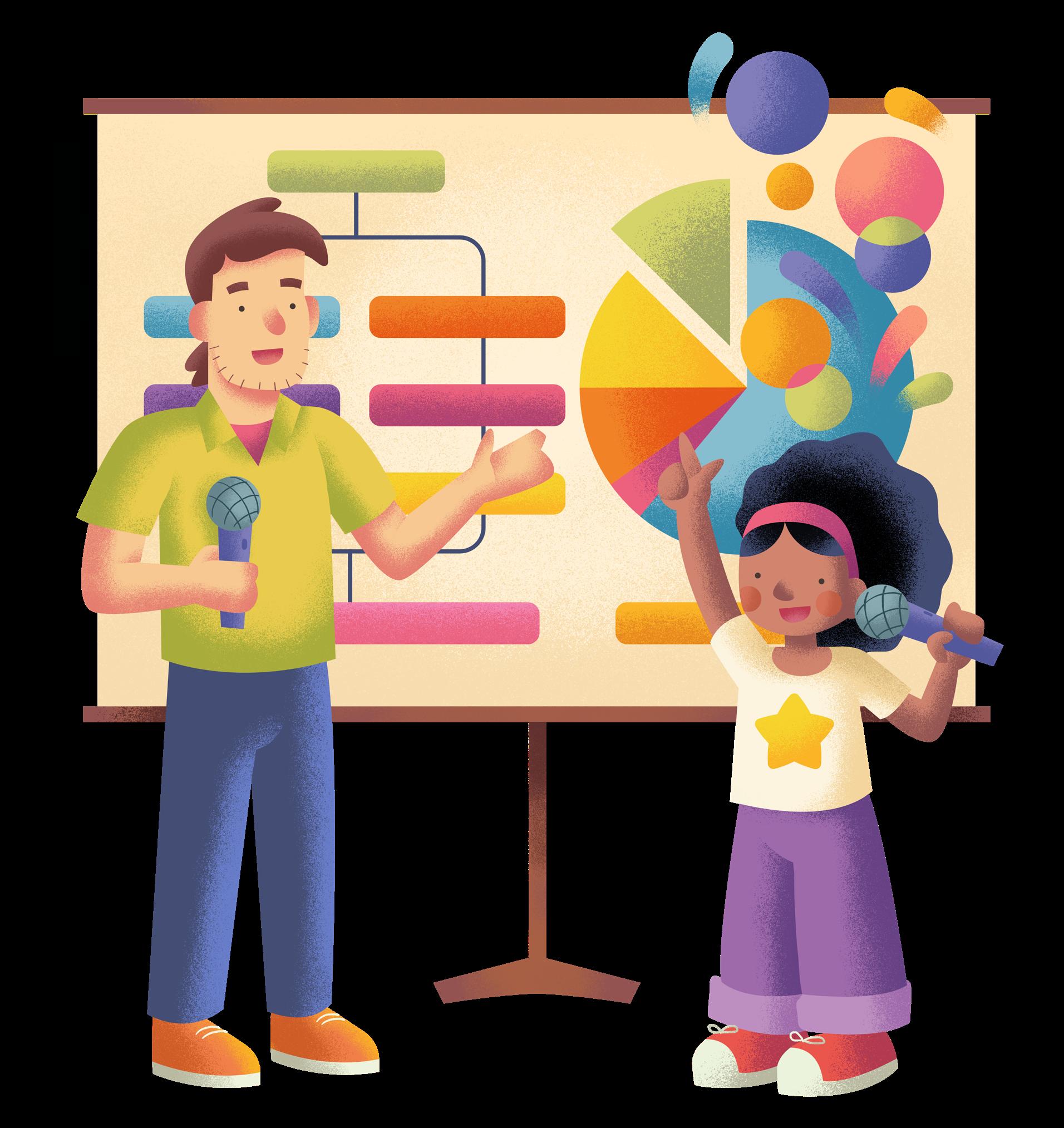
The Foundation deepened its engagement with the International and Canadian Child Rights Partnership (ICCRP), contributing to a global effort that champions intergenerational collaboration and meaningful child participation across research, policy, and practice.
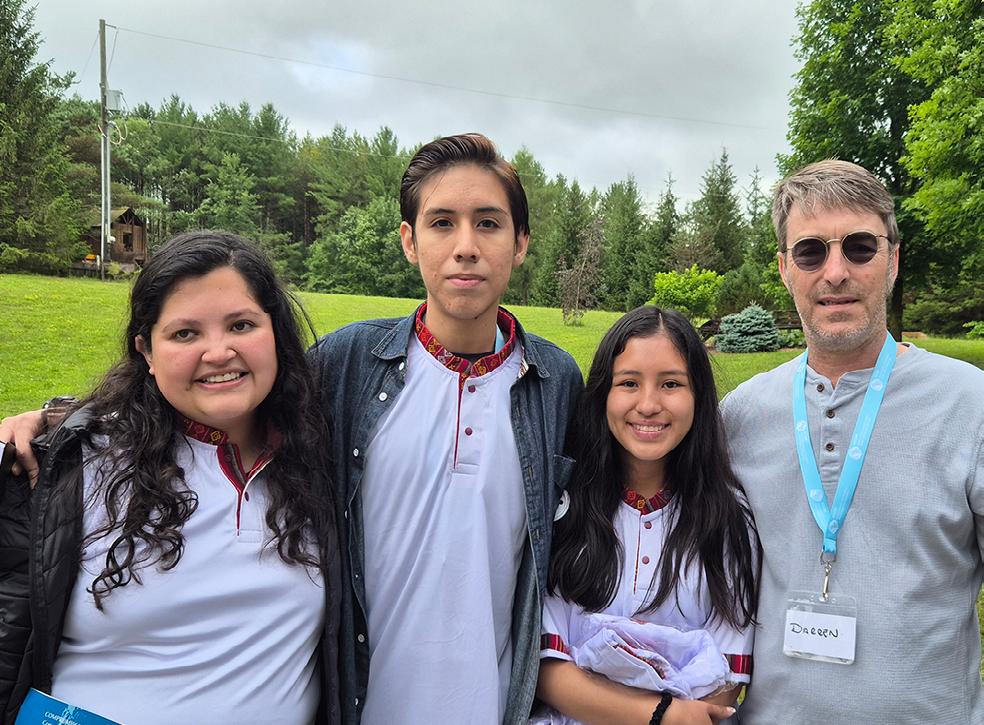
The Foundation collaborated with Philea through its Thematic Network on Children and Youth, contributing to a webinar series designed to strengthen youth participation practices across the philanthropic sector.

Key moments included:
• Participation in a roundtable on Decolonisation in Children’s Rights, featuring Juan Angel del Castillo (Bolivia) as a youth speaker.
• Youth representatives Juan Angel del Castillo and Gabriela Perez joined the ICCRP 2024 Partnership and Engagement Event in Canada, sharing Bolivia’s experience with child participation.
• Participation in World Children’s Day webinars on Decolonial Approaches to Children’s Rights and The Ethics of Compensation in Research.

• BOLIVIAN YOUTH LEADERS JOIN ICCRP EVENT TO CHAMPION CHILD RIGHTS
We contributed to three sessions in the series:
• February: Developing a Youth Advisory Board
• April: How to Use Participation Methods to Reach Young Voices
• June: How to Conduct Research with Young People
At the Philea Forum 2024, we co-facilitated the workshop The Challenge of Poor Mental Health in European Children and Youth: What Role for Philanthropy?—highlighting the role of funders in addressing growing mental health needs among children and adolescents.
A series of high-level events, roundtables, and collaborative campaigns across Europe and beyond served as key opportunities to advance advocacy priorities on child participation, well-being, education, and mental health.
2024 HIGHLIGHTS:
European Parliament High-Level Debate - Presented the What Makes Me? Core Capacities for Living and Learning report during a session hosted by Vice-President Ewa Kopacz on inclusive education.
Schools4Health Policy Event - Shared how the Learning for Well-being Framework supports the integration of health and wellbeing in school environments.
#VoteForChildren Campaign LaunchJoined the pan-European campaign mobilising MEP candidates to prioritise children’s rights ahead of the EU elections.
Encouraging Youth Participation in Europe (EESC, COYV Project) - Presented findings and launched the Youth Voting Toolbox to strengthen democratic engagement among young people.
Youth Participation & Leadership Event in Ghent - Invited by Assifero to present the We Are Here Toolkit and L4WB Framework at the gathering of European community foundations.
SOS Children’s Roundtable on Mental Health - Discussed early interventions for vulnerable youth, joining young advocates and MEPs in calling for more holistic mental health strategies.
Eurochild Collaboration - Launched a new partnership through shared publications, including a spotlight on the Guidelines on Well-being at School.
World Mental Health Day - Signed a Joint Statement with 32 organisations and joined Assifero’s webinar on youth mental health and participation in foundations.
National Spirituality in Education Conference (Columbia University)Presented “From Neglect to Nurture,” underscoring the role of spirituality in the full development of children.
OECD World Forum on Well-beingHighlighted the role of public policy in embedding well-being at the systemic level.
As active members of the Alliance for Childhood European Network, the Foundation played a key role in shaping and supporting the Quality of Childhood (QoC) sessions in Brussels. These events bring together Members of the European Parliament, researchers, and civil society organisations to explore how policy can better support the well-being and development of children across Europe.
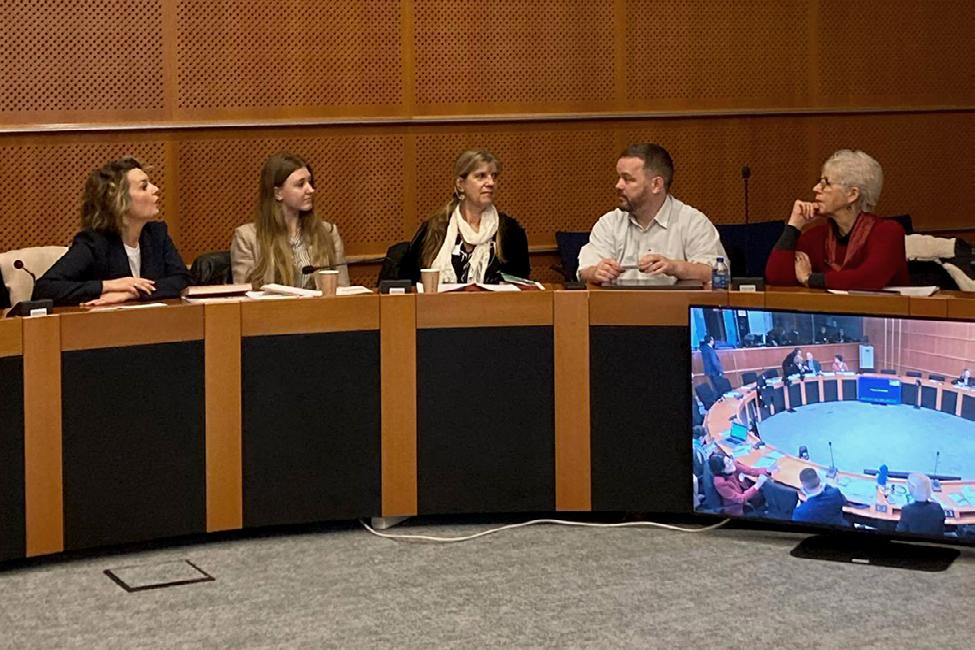
2024 SESSIONS:
March • Rethinking Curricula to Enhance Children’s Well-being - Exploring how education systems can move beyond 'tolerable' schooling to foster environments where children thrive.
July • Neuroscience and Music - The Power of Music for Social and Emotional Development: Presenting evidence on how music supports emotional and cognitive growth in children.
October • Public Policies for Children in Europe - The State of the Art on Education, Social Protection, Health, and Well-being: Discussing cross-sectoral approaches to better align public policies with children's needs.
November • Empowering Teachers for Well-being - Unlocking Creativity, Autonomy, and Resilience: Highlighting the importance of supporting teachers to create healthier and more engaging learning environments.
Strategic contributions to events and collaborative projects with the Lifelong Learning Platform (LLLP) supported shared goals of inclusion, participation, and well-being in education.
Activities included co-chairing a Workshop on Education and Polarisation during Civil Society Week, contributing to iBOX training sessions and presenting the We Are Here toolkit at LLLP Days, and participating in LLLP Week events. The Foundation also reinforced its role within the network through Chiara Piccolo’s election to the LLLP Steering Committee.
Through the continued leadership of Maria Belen Paz as Vice-President of the Executive Committee, the Foundation strengthened its ties with Child Rights Connect. Key contributions included the unveiling of the Geneva Declaration of the Rights of the Child, marking its 100th anniversary, and the XXIII Pan American Congress of Children and Adolescents.

• INTERGENERATIONAL COLLABORATION AT THE XXIII PAN AMERICAN CONGRESS OF CHILDREN AND ADOLESCENT



The Learning for Well-being Institute (L4WB-i) works hand in hand with the Foundation to generate rigorous research that fuels programme development, advocacy, and systemic change.
In 2024, the Institute expanded its global reach through commissioned studies with multilateral agencies and active participation in policy dialogues—strengthening efforts to embed children’s well-being at the heart of education, health, and social protection systems.
KEY COMPLETED AND ONGOING WORK INCLUDED:
THE IMPACT OF SOCIAL PROTECTION AND CHILD BENEFITS IN REDUCING DRIVERS OF POVERTY AND INEQUALITY
Commissioned by the ILO, this study contributed to the World Social Protection Report 2024–2026, analysing how social protection and child benefits reduce poverty drivers and promote equitable transitions for adolescents.
DELIVERING ON A CHILD POLICY PORTFOLIO IN URUGUAY
Commissioned by UNICEF Uruguay, this study consolidated evidence and projected the effects of child poverty policy reforms to inform political parties ahead of the 2024 elections.
DELIVERING ON A CHILD POLICY PORTFOLIO IN URUGUAY
Commissioned by UNICEF Uruguay, this study consolidated evidence and projected the effects of child poverty policy reforms to inform political parties ahead of the 2024 elections.
Commissioned by Theirworld and developed with Columbia and York Universities, this study examined the consequences of underinvesting in early childhood across the G20, EU, and AU. The findings informed the Every Family, Every Child report and were featured at the G20 Summit, where Dominic Richardson joined global leaders to advocate for early years investment.
Commissioned by UNESCO, this background paper informed the 2024 Global Report on Early Childhood Care and Education. It reviewed over 200 peer-reviewed studies and examined links between family policy and children’s early learning and well-being. L4WB-i joined the launch at UNESCO headquarters in Paris.
WELL-BEING:
Commissioned by UNICEF Innocenti – Global Office of Research and Foresight, this research provided a long-term analysis of how demographic change, digitalisation, and climate crisis trends will affect child well-being by 2050.
ACTION FOR 2030
Launched at the UN General Assembly, this joint policy brief with UNICEF highlights costeffective, evidence-based actions to improve child well-being. The Institute’s research contributed to recommendations on child benefits, early childhood development, immunisation, and girls’ education. Presented at a high-level event attended by senior leaders from Brazil and the US, Malala Yousafzai, among others, the launch underscored the urgency of scaling proven interventions to meet the 2030 SDGs.

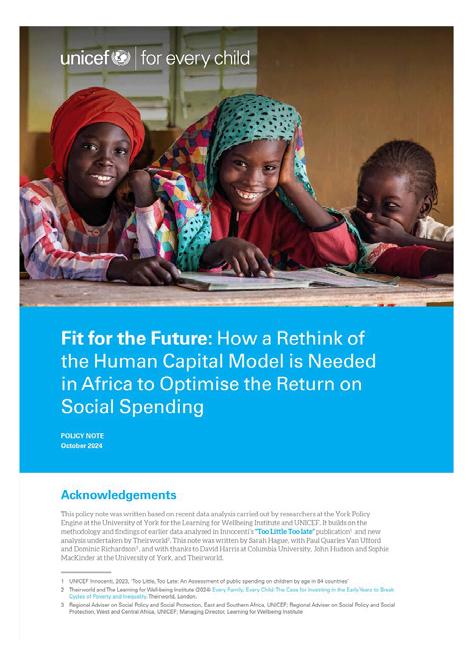



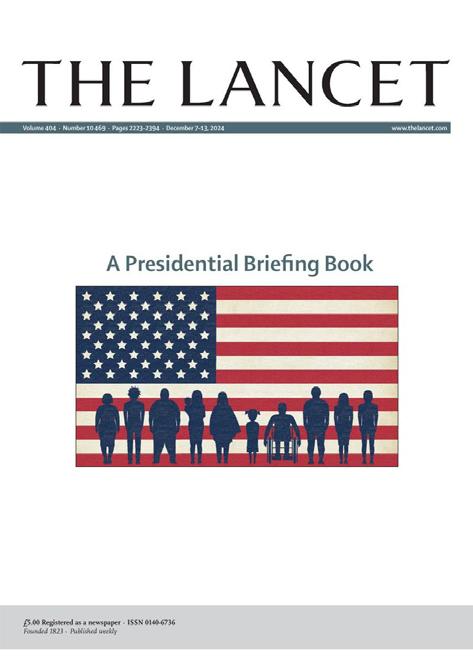
Proven Solutions for Children –Accelerating Progress Towards the Sustainable Development Goals and Beyond (UNICEF, 2024)
Fit for the Future: How a Rethink of the Human Capital Model is Needed in Africa to Optimise the Return on Social Spending (UNICEF Eastern and Southern Africa, 2024)
Laying the Foundations for Sustainable and Equitable Social Development: Early Childhood Development, the G20, and the Costs of Inaction (Richardson et al., 2024)
Assessing the Effectiveness of Complementary Investments into Cash Benefits and Care Services, Including Health Protection Mechanisms (ILO and Learning for Well-being Institute, 2024)
Role for Nutrition and Early Child Development Policies in the G20 and Beyond (T20 policy brief –Richardson et al., 2024)
Protecting the Health of Children with Universal Child Cash Benefits (Shaefer et al., The Lancet Group, 2024)
REVIEW ALL PUBLICATIONS
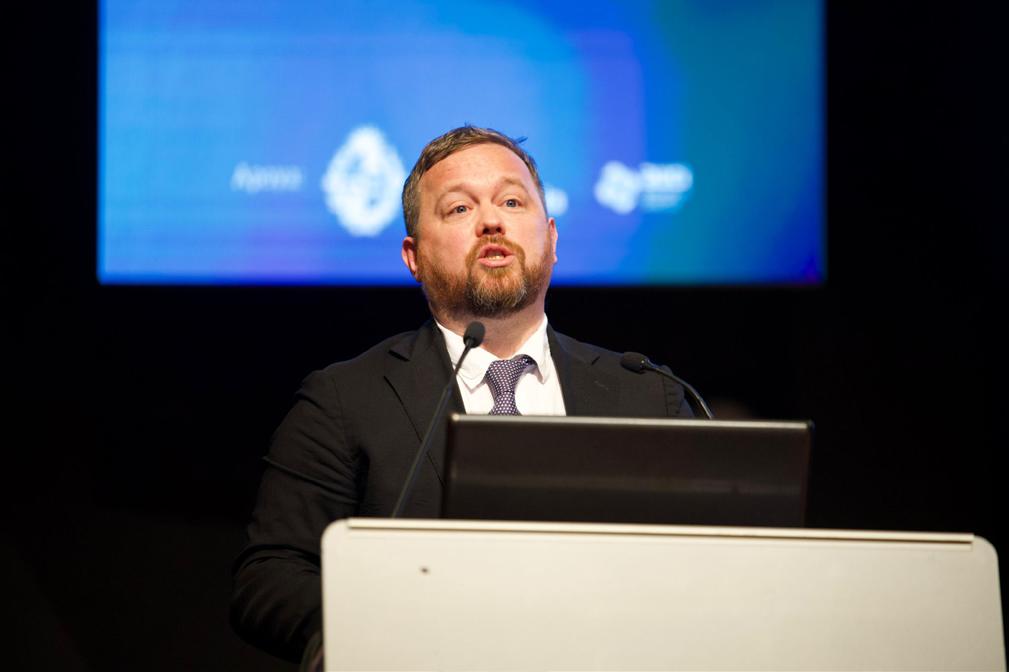


UN General Assembly – events with ECDAN, SOS Children’s Villages, and Theirworld
UNICEF Slovakia – Workshop on child poverty and well-being
UNICEF Uruguay – Seminar on childhood investment
Chinese Academy of Social Sciences – Keynote on global well-being trends
Columbia University – National Spirituality in Education Conference
ISSA Conference 2024 – Workshop on holistic ECD ecosystems
UN DESA – Chaired session for the International Day of Families
UNICEF China and UNICEF Eastern & Southern Africa – Expert sessions
EASP/FISS Joint International Conference – Comparative policy presentation
Global Roundtable on Financing for Young Children and Families
Act for Early Years Symposium –Policy discussions at UNGA
Global Launch of the Children’s Care and Protection Report – SOS CVI

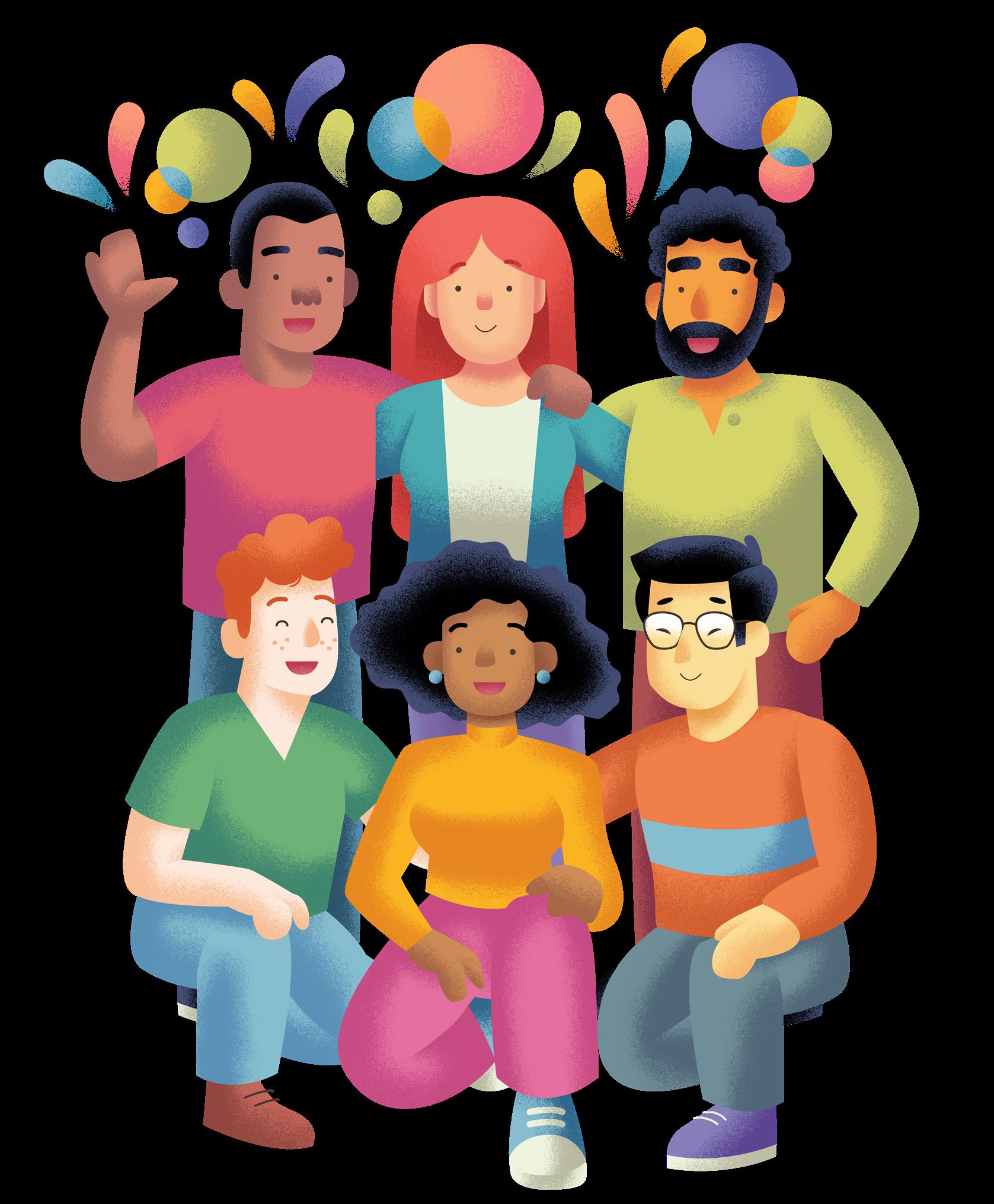
The Foundation undertook a structured organisational development process, guided by expert Gunilla Olsson, to strengthen its internal capacity and long-term direction. This work laid the groundwork for more aligned, values-based action across all teams and geographies.
An integral review of internal policies was launched to ensure alignment with evolving strategic priorities. Newly introduced or updated policies include:
• Code of Conduct
• Guidance on Evidence and Ethics
• Social Media Communications Policy
In response to global crises and shifting operational contexts, the Foundation also hosted three all-team trainings on trauma-informed practices, safeguarding, and ethics in times of conflict.
To support programme growth and strengthen operational capacity, four new team members joined the Foundation in 2024:
• Celia Hsiao, Head of Programmes
• Giovanni Vassallo, Grants Manager
• Hila David, Programme Designer
• André Abreu, Executive Assistant
Younger members of the Board actively participated in the recruitment process, modelling the Foundation’s intergenerational approach in action.
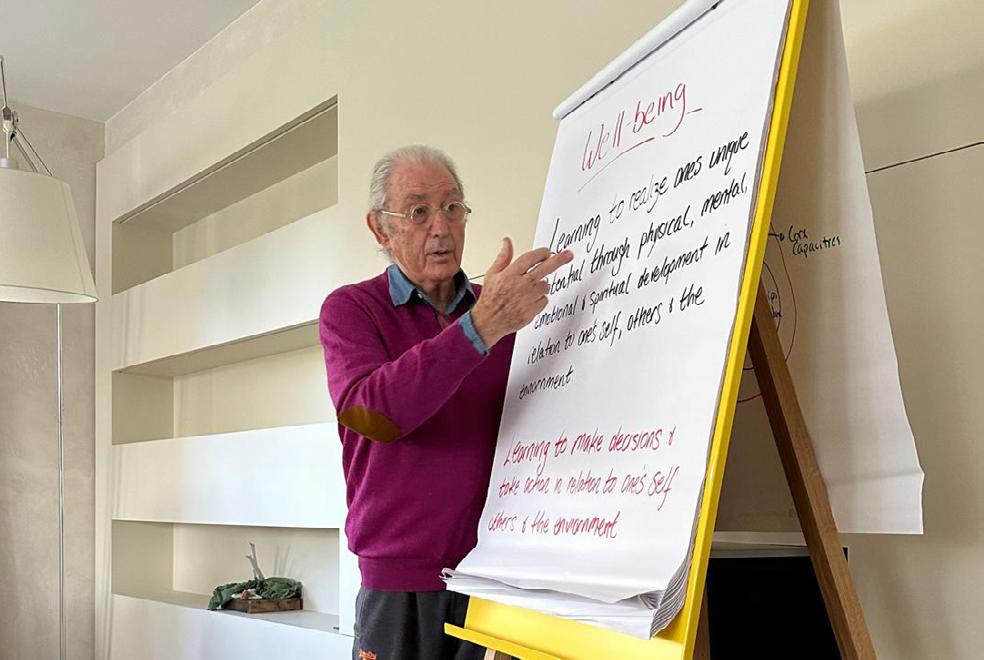
Communications efforts focused on laying the foundation for a more strategic and cohesive organisational identity, while expanding outreach through targeted digital engagement. A comprehensive brand strategy plan was initiated to define the Foundation’s core narrative, values, and positioning, guiding consistent, purpose-driven messaging across all platforms.
These efforts were complemented by improvements across digital channels:
Website: Improvements were made to content structure and navigation, with plans underway for expanded news and programme pages aligned with the brand identity.
LinkedIn: Continued to serve as the primary platform for engaging professionals, showcasing research, partnerships, and high-level advocacy.
Facebook & Instagram: Used to strengthen engagement with general audiences, particularly around events, youth-led content, and visual storytelling.
In 2025, the Foundation will focus on the design, implementation, and scaling of its three newly defined programme areas:
• Inner Diversity
• Relationships and Communication in Families
• Participation and Engagement
Each programme represents a distinct domain of human development that supports children’s wellbeing and the systems that influence their lives.

Together, these programme areas mark a pivotal step in translating the Foundation’s core impact pathways—school reform, holistic well-being, and intergenerational collaboration—into structured, participatory offers. Grounded in the Learning for Well-being Framework, they are designed to be adaptable across diverse contexts and audiences.
All programmes will follow a unified structure that applies the Learning for Well-being Framework in real-world settings. Each begins with an introduction to the Framework, followed by a series of practices that activate the nine core capacities— innate human abilities such as listening, reflecting, and empathising—practised across three interconnected dimensions: mental, emotional, and physical.
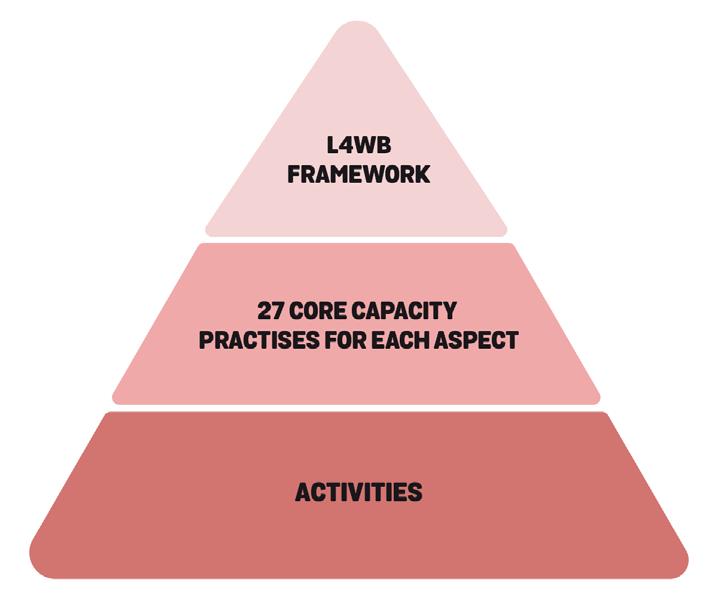
These structured experiences aim to deepen participants’ self-awareness, foster relational connection, and build capacity for meaningful action—supporting both individual development and systemic transformation.
Each programme is participatory and contextresponsive, offering tools and experiences that reflect and respect diverse cultural, educational, and community realities. Whether implemented in schools, families, organisations, or wider communities, the goal is to cultivate environments where individuals are empowered to realise their unique potential and contribute to inclusive, nurturing systems.
1,390,441
LEARNING FOR WELL-BEING FOUNDATION
learningforwellbeing.org
Europaboulevard 57, 1083 AD Amsterdam +31642481361
info@learningforwellbeing.org
PHOTOS Learning for Well-being Foundation ILLUSTRATIONS Armin Castellón